Understanding Methane Emissions from Cattle
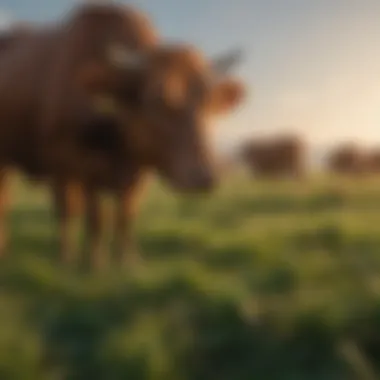
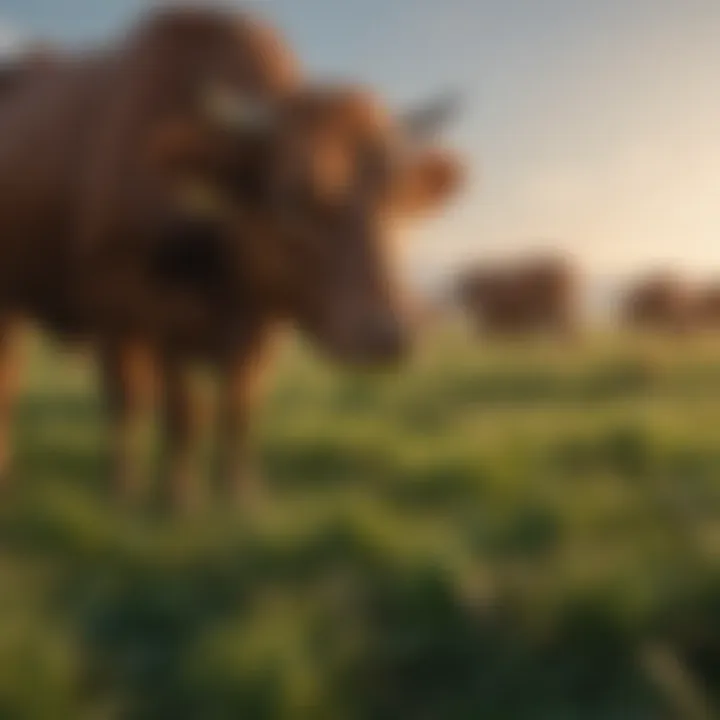
Intro
Understanding the environmental impact of methane emissions from cattle is critical in today’s agricultural practices. Methane, a potent greenhouse gas, plays a substantial role in climate change. The way cows digest food significantly influences methane production. Studying this issue is vital for farmers, researchers, and policymakers focused on sustainable agriculture.
Carbon emissions from livestock are a growing concern. Cattle farming not only contributes to greenhouse gases but also affects soil health and water quality. Recognizing the intricacies of methane emissions from cows is necessary for innovating effective solutions. This article will delve into key concepts related to methane release, current trends in agriculture, and practical applications that can help mitigate this issue.
Prelims to Methane Emissions
Methane emissions represent a critical concern within the discourse of agriculture and environmental sustainability. The significance of this topic stems from the multifaceted impacts methane has on climate change and the broader ecosystem. Understanding methane emissions is not merely an academic exercise; it has practical implications for farmers, policymakers, and environmental advocates. Increasing awareness of methane's contributions to global warming can drive more responsible agricultural practices, ultimately benefiting both the economy and the environment.
Methane is a potent greenhouse gas, possessing a heat-trapping ability that is many times greater than carbon dioxide over a short time frame. Its release from livestock, particularly from cattle, accounts for a significant portion of agricultural emissions. Given the rising demand for meat and dairy products, the efficiency with which we manage methane will only grow in importance.
Definition of Methane
Methane (CH₄) is a colorless, odorless gas that forms during the decomposition of organic material in the absence of oxygen. Its molecular structure consists of one carbon atom and four hydrogen atoms, making it the simplest hydrocarbon. Due to its potency as a greenhouse gas, capturing and effectively managing methane is essential for combating climate change.
Sources of Methane in Agriculture
Cattle and other livestock are primary sources of methane emissions in agriculture. The production of methane mainly occurs through two processes:
- Enteric fermentation: This is the digestive process in ruminants where microbes in the stomach break down food. During this fermentation, methane is produced and expelled primarily through belching.
- Manure management: Methane is also released from livestock manure as it decomposes under anaerobic conditions. Techniques for managing manure can either exacerbate or diminish methane release.
Understanding these sources helps in identifying effective strategies for mitigating emissions. A shift towards improving livestock diets and better manure management practices is crucial in reducing methane emissions.
Cattle as Major Methane Producers
Understanding the contribution of cattle to methane emissions is essential for comprehending the broader implications on climate change. Cows are not just sources of meat and dairy; they also play a significant role in greenhouse gas emissions, primarily through the methane produced during their digestive processes. An increased awareness of these emissions is necessary to develop effective mitigation strategies that actually target the source of the problem.
When cows digest grass and other plant materials, a complex process occurs. This process involves fermentation in the rumen—a specialized stomach compartment that contains a diverse community of microorganisms. These microbes break down fibrous plant material, creating methane as a byproduct. This release is not negligible; studies indicate that livestock, particularly cows, contribute approximately 14.5% of all human-induced greenhouse gas emissions, which is a significant portion.
Given the scale of cattle farming globally, the implications of these emissions cannot be overlooked. The environmental consequences are evident in the context of climate change. Methane is a potent greenhouse gas, with a global warming potential many times greater than carbon dioxide, especially in the short term. Therefore, addressing methane emissions from cattle represents not only a challenge but also an opportunity to make substantial progress towards climate goals.
Digestive Processes in Cows
Cows possess a unique digestive system designed for breaking down fibrous plant materials. Their stomach has four compartments: the rumen, reticulum, omasum, and abomasum. Among these, the rumen is where most fermentation—and subsequently, methane production—occurs.
In the rumen, feed is mixed with saliva and the diverse microbial population. These microbes help decompose complex carbohydrates, which would otherwise be indigestible. This decomposition process includes the production of volatile fatty acids and methane gas, which cows expel either through belching or flatulence.
Overall, the digestive efficiency of cows and their ability to convert roughage into energy is remarkable. However, this also means that improving feed efficiency can have a dual benefit—enhancing the productivity of the cows while also reducing methane output.
Factors Influencing Methane Production
Several factors influence the amount of methane produced by cows, including:
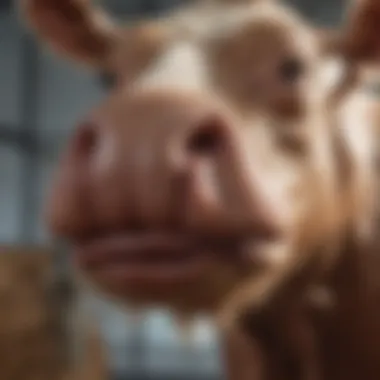
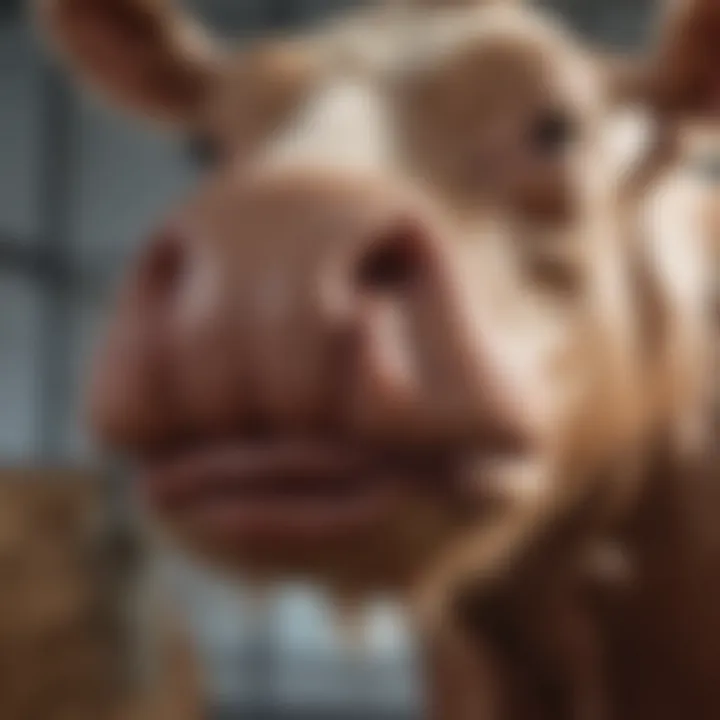
- Diet Composition: The type of feed significantly impacts methane production. For example, diets high in carbohydrates typically lead to more methane emissions than those rich in fats.
- Digestive Health: The overall health of the cow's rumen and microbial ecosystem can affect fermentation efficiency.
- Breeding and Genetics: There is ongoing research focused on breeding cattle with lower methane emissions. Genetic selection can lead to cows that are more efficient in their feed conversion rates.
- Management Practices: Environmental factors and management practices, such as the method of grazing or housing conditions, also affect methane output.
To mitigate methane emissions effectively, it is essential to focus on these factors. Understanding how diet, health, and management interact can lead to informed, science-based decisions.
In summary, recognizing the critical role of cattle as major methane producers reveals a crucial aspect of global greenhouse gas emissions. Addressing this issue through various means, including dietary adjustments and improved management practices, holds the promise for more sustainable cattle farming.
The Role of Ruminants in Greenhouse Gas Emissions
Ruminants, particularly cattle, play a profound role in global greenhouse gas emissions. Understanding this impact is essential for addressing climate change effectively. The metabolic process in ruminants contributes notably to the release of methane, a potent greenhouse gas. This is due to their unique digestive system, which includes a specialized stomach structure. Cattle utilize fermentation to break down plant materials efficiently, however, this process results in methane production, which is released into the atmosphere primarily through belching.
Quantifying Methane Emissions from Cows
Quantifying the methane emissions from cows helps establish a baseline for emissions reduction efforts. Research indicates that an average cow produces about 100 to 200 kg of methane per year, depending on several factors such as diet, breed, and management practices.
- Digestive Contribution: Approximately 95% of methane emissions from cattle result from enteric fermentation. This biochemical process involves microbes in the stomach breaking down food, which leads to the generation of methane as a byproduct.
- Measurement Methods: Various methods like respiration chambers and tracer techniques are utilized to measure emissions. These methods can vary in complexity and precision.
- Variability Factors: Factors influencing methane emissions include:
- Respiration Chambers: Enclosed systems where cows are kept, allowing researchers to measure the exact amount of methane produced.
- Tracer Techniques: Involves using isotopes to track and measure methane emissions in natural settings, providing real-world data that is crucial for understanding overall contributions.
- Feed Type: Different feeds lead to varying levels of methane production. High-fiber diets often produce more methane than concentrates.
- Animal Health: Healthier animals may produce less methane due to more efficient digestion.
- Production System: Intensive farming systems may have different methane outputs compared to extensive systems.
Global Impact of Livestock Methane
The contribution of livestock methane emissions to global warming is significant. Livestock account for around 14.5% of all human-induced greenhouse gas emissions. This places urgency on understanding and managing these emissions.
- Climate Change Contribution: Methane has a far greater global warming potential compared to carbon dioxide, being more than 25 times effective at trapping heat in the atmosphere over a 100-year period.
- Regional Variations: Impact differs by region. For instance, in regions with heavy livestock farming, the local environment suffers more due to elevated methane concentrations.
- Economic Significance: Additionally, methane emissions have economic implications for agriculture. Increased pressure from environmental regulations may affect farming practices and profitability.
"Addressing methane emissions from cattle is crucial for transitioning to sustainable agricultural practices."
Overall, a nuanced understanding of ruminants and their methane emissions paves the way for targeted solutions in agriculture, facilitating an effective response to climate change.
Mitigation Strategies for Methane Emissions
Mitigation of methane emissions from cattle is a critical area of focus in efforts to combat climate change. Reducing these emissions requires a multifaceted approach that encompasses various strategies involving diet, management, and technology. The strategies discussed below aim not only to lessen the environmental impact but also to improve the overall efficiency of cattle farming. Implementation of these initiatives can lead to sustainable practices that benefit both the farmers and the environment.
Dietary Adjustments to Reduce Methane
Dietary adjustments are one of the most effective methods for mitigating methane emissions from cattle. The composition of a cow's diet significantly influences the amount of methane produced during digestion, especially in the rumen.
- High-Quality Forage: Increasing the proportion of high-quality forage can enhance digestion and nutrient absorption. Improved digestibility often leads to lower methane production as the feed is utilized more efficiently.
- Inclusion of Oilseeds: Adding oilseeds, such as canola or soy, can reduce methane emissions. Oils provide a concentrated energy source without significantly contributing to methane production.
- Supplemental Nutrients: The use of supplements like tannins from specific plants can inhibit methanogenic bacteria. These natural compounds can alter microbial populations in the rumen, leading to reduced methane emissions.
Research indicates that adjusting the feed ration can yield substantial reductions in methane production, sometimes by 20-30%. Such dietary shifts can also improve overall herd health and productivity.
Innovations in Livestock Management
Innovations in livestock management play an essential role in controlling methane emissions. Practicing improved management techniques can optimize animal performance and minimize waste.
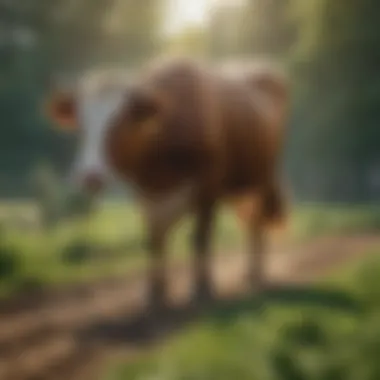
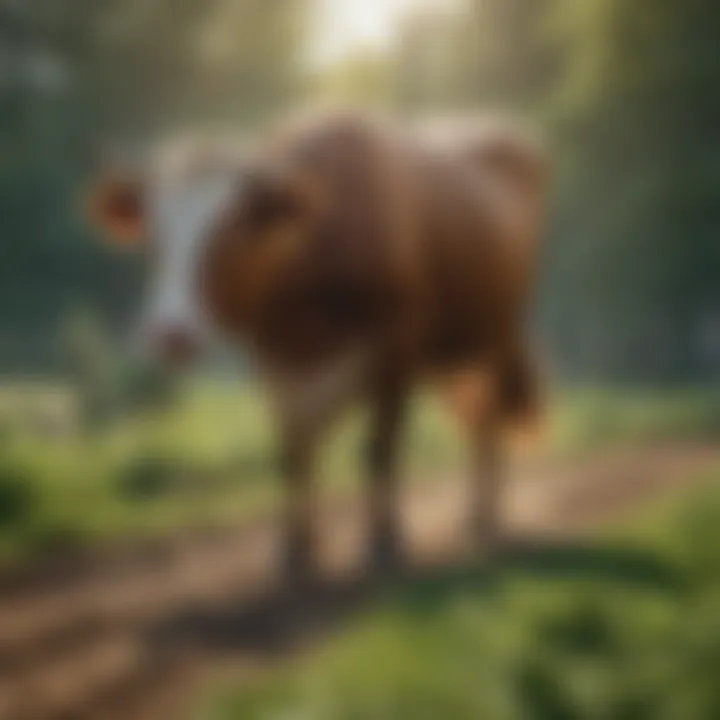
- Grazing Methods: Implementing rotational grazing techniques helps maintain pasture health and improves carbon sequestration. This practice allows different pasture areas to recover, reducing the need for fertilizer and consequently lowering emissions.
- Animal Health Monitoring: Regular monitoring and health assessments facilitate early detection of issues that can lead to inefficient resource use. Healthy animals convert feed to energy more effectively, inherently producing less methane.
- Precision Farming: Utilizing technology to monitor herd movements and behavior enhances pasture management. It ensures animals graze optimally, helping to prevent overgrazing and soil depletion, which contributes to methane emissions.
Utilization of Feed Additives
Feed additives represent a promising solution to mitigate methane emissions from cattle. These substances can be incorporated into the diet to reduce methane production during digestion.
- Nitrates: Nitrate-based feed additives can reduce methane emissions by serving as an alternative electron acceptor in the digestive process. This substitution helps minimize methane formation.
- Probiotics: Adding specific probiotics can alter the microbial population in the rumen. These beneficial bacteria can enhance fermentation efficiency and lower methane emissions.
- Seaweed Supplements: Research has shown that certain types of seaweed, like Asparagopsis taxiformis, can reduce methane emissions by up to 80% when included in cattle diets. This latter solution holds great promise for large-scale adoption.
The incorporation of innovative feed additives into cattle diets tailors emissions reductions while maintaining production levels. Each strategy underscores the critical need, as society focuses on sustainable agriculture, to lower the carbon footprint of cattle farming.
"Strategies aimed at mitigating methane emissions not only benefit the environment but can also enhance productivity and health outcomes for livestock, creating a win-win for farmers and the planet."
Role of Technology in Mitigating Emissions
The role of technology in mitigating methane emissions from cattle is pivotal. As climate change intensifies, the agricultural sector faces increasing scrutiny for its environmental footprint. Technology offers solutions that can enhance efficiency and significantly lower methane output. By integrating innovative technologies, farmers can not only adhere to regulatory guidelines, but also contribute to global efforts in combating climate change.
Monitoring Methane Emissions
Monitoring methane emissions is a foundational step in addressing the problem. Technologies such as remote sensing and satellite imaging allow for the tracking of methane concentrations in real-time. This data empowers farmers and researchers to better understand emission patterns and identify specific periods or practices that result in higher outputs. Additionally, in-field devices can analyze the emissions from livestock directly. By incorporating sensors that measure gas levels, farms can receive immediate feedback, allowing for timely adjustments to management practices.
Monitoring technologies also encompass software solutions that compile and analyze data, providing actionable insights. Farmers can use this information to optimize feeding regimens, manage pasture conditions, and streamline herd health interventions. Overall, continuous monitoring enables a more informed, precision-based approach to methane management, potentially leading to substantial reductions in emissions.
Innovations in Farming Practices
Innovations in farming practices have emerged as vital strategies for lowering methane emissions from cattle. These advancements focus on improving feed efficiency, herd management, and overall farm operations.
- Feed Optimization: Altering the diet of cattle can have a significant impact on methane production. Incorporating high-quality forages, grains, and legumes improves digestion efficiency, thus reducing methane output. Research suggests that specific supplements like seaweed or tannins can drastically lower emissions when added to the diet, making it a promising area for innovative practices.
- Manure Management: The way manure is handled is equally important. Implementing cover crops and better composting techniques can reduce methane emissions from manure storage. Properly aerated systems break down waste more efficiently, limiting the methane produced during decomposition.
- Pasture Management: Adopting rotational grazing techniques ensures that pastures are not over-grazed. Healthy grasslands sequester carbon and promote biodiversity. This reduces stress on cattle and contributes to lower methane emissions over time.
These innovations, driven by technology, not only help in managing methane emissions but also enhance overall farm productivity and sustainability. Transitioning to these practices requires initial investment, but the long-term benefits present a compelling case for adoption.
"Technology and innovative practices not only promise a decrease in methane emissions but also ensure the sustainability and resilience of the agricultural sector in the face of climate challenges."
In summary, the implementation of technology in monitoring and the drive for innovative farming practices are critical in the fight against methane emissions from cattle. By embracing these solutions, farmers can play an active role in reducing their environmental impact while maintaining profitable operations.
Policy Implications and Agricultural Practices
Understanding the connection between policy implications and agricultural practices is essential to addressing methane emissions from cows. Governments and regulatory bodies play a crucial role in shaping practices that can either exacerbate or alleviate the effects of methane release. Well-structured policies can incentivize farmers to adopt more sustainable practices while holding them accountable for their contributions to greenhouse gas emissions.
Regulatory Frameworks and Initiatives
Efficient regulatory frameworks are vital for controlling methane emissions. Several initiatives aim to guide farmers towards environmentally friendly practices. For instance, policies that enforce limits on methane emissions can drive innovations in livestock management. This includes funding for research on efficient feeding methods or breeding programs aimed at producing less methane.
Governments can also provide financial support to farmers who adopt desired practices. They may offer subsidies for feed additives known to reduce methane production or grants for upgrading farming technologies. Clear guidelines should be established to create a pathway for improvement without stifling innovation.
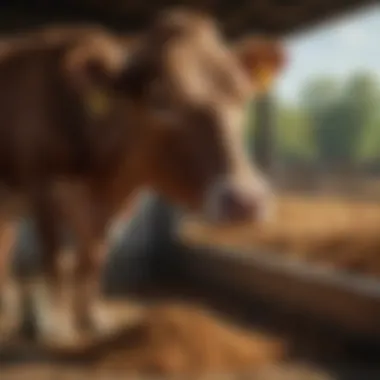
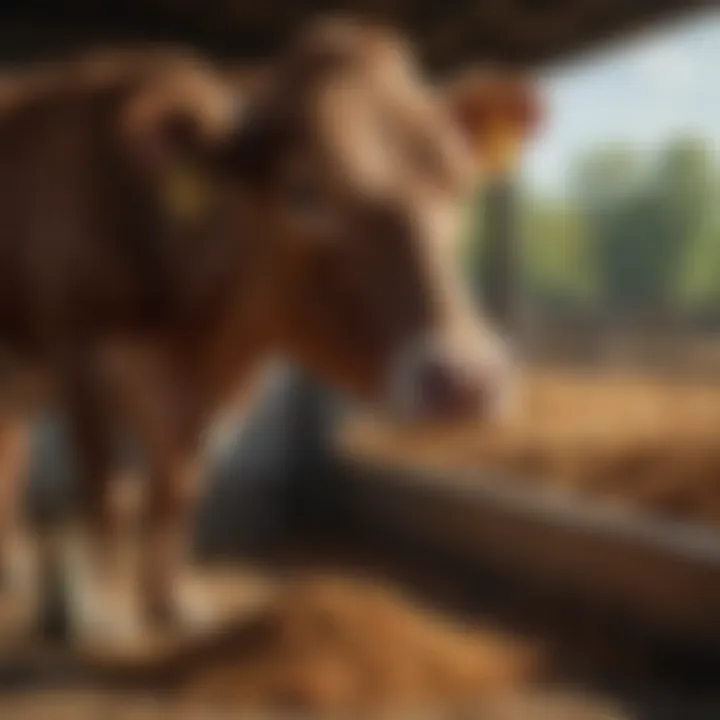
"Clear regulations can encourage farmers to see sustainability as an opportunity rather than a burden."
Initiatives like carbon credits can also be effective. Programs that reward farmers for reducing methane emissions can shift the economic burden towards more sustainable outputs. By implementing these frameworks, there is an opportunity for both environmental and economic improvement.
Educating Farmers on Sustainable Practices
Education presents a unique approach to address methane emissions at the grassroots level. By providing farmers with the necessary knowledge and resources, they can implement sustainable farming practices more effectively. Understanding the science behind methane emission reduction can empower farmers to make informed decisions.
Workshops and training programs focused on innovative grazing techniques and feed management can significantly reduce methane output. Practical knowledge of how different feed types influence methane production is essential. Research has shown that a diet high in certain grains, as opposed to forages, can lower emissions.
Moreover, collaborations with agricultural extension services can enhance reach. These services can provide tailored advice based on local conditions and help farmers adopt best practices. Encouraging peer-to-peer knowledge sharing can also create a community of practices that propagate sustainable methods.
In essence, the combination of strong regulations and robust educational initiatives can lead to meaningful progress in reducing methane from cows. Stakeholders in agriculture have a critical role in this transition, as they balance productivity with environmental stewardship.
Future Trends in Cattle Farming
Understanding future trends in cattle farming is essential to address the significant issue of methane emissions from cows. As climate change continues to pose a threat, the agricultural sector must adapt to emerging research and sustainable practices that can mitigate these emissions.
Emerging Research in Emission Reduction
Emerging research in methane reduction offers promising avenues for improving cattle farming practices. Researchers are exploring various strategies to decrease methane outputs, particularly through innovations in animal feed. For instance, studies have shown that specific feed additives, such as seaweed, can significantly limit methane production during digestion. Moreover, genetic studies focus on identifying traits in cattle that inherently lead to lower methane emissions. These findings can guide breeding programs towards selecting animals that produce less methane.
"Innovations in feed can potentially reduce global methane emissions by up to 30%."
In addition to dietary changes, there is ongoing research on manure management techniques. Proper handling and treatment of manure can minimize methane release. Technologies such as anaerobic digesters convert waste into biogas, providing a renewable energy source while reducing harmful emissions.
The Shift towards Sustainable Agriculture
The shift towards sustainable agriculture is not merely a choice; it is becoming a necessity as environmental concerns deepen. Sustainable cattle farming practices focus on balancing production needs with ecological preservation. For farmers, adopting sustainable methods can offer multiple benefits, both environmentally and economically.
- Improved animal health and productivity through better husbandry practices.
- Reduced input costs through optimized resource use.
- Compliance with regulatory standards aimed at reducing agricultural impact on climate change.
Farmers are increasingly asked to implement rotational grazing systems, which can enhance soil health and reduce overgrazing. Enhanced pasture management leads to healthier cows, which can, in turn, produce less methane. Beyond immediate farm management, the entire supply chain needs to consider sustainability.
The End
The examination of methane emissions from cows is critical in understanding their environmental implications. Methane remains a potent greenhouse gas, with significant effects on climate change. The discussions throughout this article highlight several important elements surrounding this topic. First, it underscores cattle as one of the main contributors to methane emissions through their natural digestive processes.
Second, effective mitigation strategies are not just beneficial but vital. Innovations in livestock management and dietary adjustments can drastically reduce emissions. Understanding these practices helps in creating sustainable farming methods that can benefit both the environment and the agricultural sector.
Moreover, the role of technology in monitoring and improving cattle farming must be emphasized. Continuous advancements can guide farmers in reducing their ecological footprint while sustaining productivity. Ultimately, acknowledging these factors encourages a more responsible approach to livestock management.
Recap of Key Points
- Methane from cows contributes significantly to greenhouse gas emissions.
- Digestive processes play a key role in the production of methane.
- Various strategies, such as dietary adjustments and the use of feed additives, can mitigate emissions.
- Technological innovations and policies are crucial in promoting sustainable farming practices.
Call to Action for Stakeholders
Stakeholders in the agriculture sector must prioritize the urgency of addressing methane emissions from cattle. Policymakers should develop targeted regulations that support farmers in adopting cleaner practices. Additionally, farmers need access to resources and education about sustainable methods.
Furthermore, research institutions should continue investigating innovative solutions that can benefit livestock farming. Collaboration among scientists, policymakers, and farmers can lead to the practical implementations necessary for a reduction in methane emissions. By taking action now, we can pave the way for a more sustainable agricultural future.



